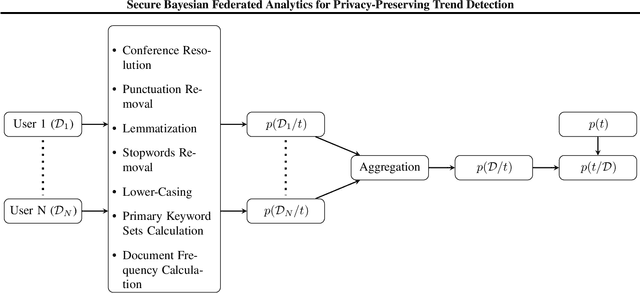Amit Chaulwar
Secure Bayesian Federated Analytics for Privacy-Preserving Trend Detection
Jul 28, 2021

Abstract:Federated analytics has many applications in edge computing, its use can lead to better decision making for service provision, product development, and user experience. We propose a Bayesian approach to trend detection in which the probability of a keyword being trendy, given a dataset, is computed via Bayes' Theorem; the probability of a dataset, given that a keyword is trendy, is computed through secure aggregation of such conditional probabilities over local datasets of users. We propose a protocol, named SAFE, for Bayesian federated analytics that offers sufficient privacy for production grade use cases and reduces the computational burden of users and an aggregator. We illustrate this approach with a trend detection experiment and discuss how this approach could be extended further to make it production-ready.
Private Dataset Generation Using Privacy Preserving Collaborative Learning
Apr 28, 2020



Abstract:With increasing usage of deep learning algorithms in many application, new research questions related to privacy and adversarial attacks are emerging. However, the deep learning algorithm improvement needs more and more data to be shared within research community. Methodologies like federated learning, differential privacy, additive secret sharing provides a way to train machine learning models on edge without moving the data from the edge. However, it is very computationally intensive and prone to adversarial attacks. Therefore, this work introduces a privacy preserving FedCollabNN framework for training machine learning models at edge, which is computationally efficient and robust against adversarial attacks. The simulation results using MNIST dataset indicates the effectiveness of the framework.
 Add to Chrome
Add to Chrome Add to Firefox
Add to Firefox Add to Edge
Add to Edge